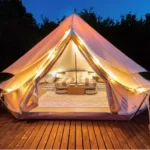Camping lovers frequently debate whether hammock vs. tent make for the best outdoor sleeping arrangements. Both choices offer advantages and disadvantages that appeal to various preferences and camping situations.
In this post, we’ll get into the hammock vs. tent issue, looking at things like sleeping arrangements, sleeping habits, and general comfort.
Read More:
- Air Mattress vs Sleeping Pad: Choosing the Best Option
- Camping Cot vs Air Mattress: A Comprehensive Comparison
Hammock vs. Tent: Which Is Better?
The age-old argument between hammocks and tents over the ideal shelter for outdoor adventures never seems to disappear.
Both approaches have their advantages and are suitable for various situations and preferences.
We’ll examine the essential differences between hammocks and tents in this comparison so you can decide which is most appropriate for your needs.
1. Sleeping Arrangements In Hammocks And Tents
The sleeping experiences offered by hammocks and tents are different.
Hammock:

For people who want to spend more time outside, hammocks offer a distinctive suspended sleeping platform. Campers are shielded from the weather by tents offering enclosed and covered places.
Its lightweight construction makes hammocks ideal for travellers looking to lighten their burden. Finding strong anchor points is necessary to set up a hammock, and these are frequently simple to come by in wooded locations.
Tents:

Despite being bulkier, tents provide excellent protection from rain, wind, and insects. To establish a sturdy shelter, they stake out the tent’s corners and gumlines
2. Sleeping Patterns in Hammock vs. Tents
When choosing between a hammock and a tent, it’s essential to understand how sleeping habits may affect your choice.
Hammock:
For some people, a hammock’s cradling sensation might result in more profound, more comfortable sleep.
There are fewer pressure points because of the gently rocking action and the level ground, which may lessen discomfort. However, because of its curvature, hammocks may not be as comfortable for side sleepers.
Tents:
Tents’ flatter sleeping surfaces can accommodate a more extensive variety of sleeping styles. In a tent, travellers may make a cosy and supportive bed with the correct sleeping bag and pad.
Due to their adaptability, tents are an excellent choice for families and parties of all different sleeping preferences.
3. Tent vs. Hammock: Comfort
Both hammocks and tents have advantages when it comes to comfort.
Hammock:
By allowing campers to sway while they sleep gently, hammocks offer a distinct resting experience that promotes relaxation. Hammocks are particularly tempting to people with back discomfort since the absence of a hard or uneven surface can relieve frequent pressure points.
Tents:
While tents lack the natural sway of hammocks, they nonetheless offer a certain level of relaxation due to their protective structure. They provide campers with a safe and weatherproof environment, protecting them from precipitation, wind, and chilly temperatures.
Hammocks can’t offer the pleasure of standing up, changing clothes, and moving around freely inside a tent.
4. Hammock Vs Tent: Weather
Hammock:
In nice weather, hammocks are the best option. They hold you off the ground, preventing contact with soggy soil and possible water ponding in light rain.
Purchasing a rain fly will help keep you dry and protected from the elements in wet settings. In colder climates, hammocks, which expose you to cold air from all sides and call for more insulation, may be less beneficial.
Tent:
Tents excel at offering a haven from a variety of weather scenarios. They provide superior defence against wind, rain, and chilly conditions.
A good tent with a rainfly can provide a dry and cosy interior when it rains heavily. Additionally, tents provide a contained environment that can be heated with the right equipment, which makes them suitable for a colder climate.
5. Tent vs. Hammock: Space
Hammock:
Hammocks are a fantastic option for long-distance hikers or minimalist travellers because they are portable and lightweight. They are space-constrained and call for two anchor points, typically trees.
Although some hammocks have storage compartments, the space that is typically accessible is only what is around you.
Tent:
In more significant types, tents provide a separate living space with more room for storing equipment, dressing, and participating in group activities.
They offer a feeling of privacy, which is particularly welcome on longer journeys. Tents are adaptable and available in sizes, including single-person and family-sized models.
6. Tent vs. Hammock: Durability
Hammock:
To resist everyday wear and tear, hammocks are made from solid materials like nylon or polyester. However, repeated folding and exposure to the elements, such as UV radiation, may shorten their lifespan.
To maintain the longevity of your hammock, proper upkeep and maintenance are essential, as are periodic checks for wear.
Tent:
Because of their resilient design and materials, tents are typically more long-lasting. High-quality tents can survive severe weather and offer superior defence against the elements.
Cleaning and seam sealing done regularly will help them last longer.
7. Hammock vs Tent: Weight
Hammock:
Hammocks are a game-changer for lightweight travellers. They are exceedingly light, taking up less place in your rucksack than other necessary items.
This function benefits thru-hikers and anyone who wants to travel large distances on foot.
Tent:
While providing greater comfort and shelter, tents typically weigh more and take up more space. This weight can be a considerable consideration for hikers and backpackers who prioritize packing light.
However, improvements in lightweight tent designs have made them more affordable for travellers concerned about weight.
Pros and Cons of Hammock vs Tent:
| ASPECTS | HAMMOCK | TENT |
| 1. Weather Resilience | Pros: Keeps you elevated from damp ground; suitable for fair weather. Cons: Requires rain fly for rain protection; less ideal for extreme weather conditions. | Pros: Lightweight and compact; great for minimalist travellers. Cons: Limited space and movement; may be uncomfortable for some individuals. |
| 2. Space and Comfort | Pros: Made from durable materials; withstands everyday wear and tear. Cons: Exposed to UV rays and wear; requires proper care and maintenance. | Pros: More spacious; offers room to sit, change, and store gear; better for group camping. Cons: Bulkier and heavier than hammocks. |
| Durability | Pros: Made from durable materials; withstands normal wear and tear. Cons: Exposed to UV rays and wear; requires proper care and maintenance. | Pros: Generally more durable due to robust construction; withstands harsh conditions. Cons: Requires regular maintenance to ensure longevity. |
| Weight | Pros: Incredibly lightweight; suitable for backpackers; takes up less space. Cons: Limited space for gear and personal items. | Pros: Offers more amenities; can accommodate gear and personal belongings. Cons: Tends to be heavier and bulkier; might not be suitable for ultralight backpacking. |
.





